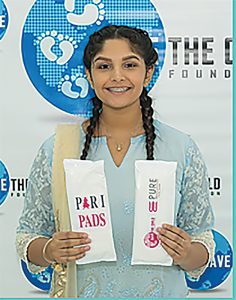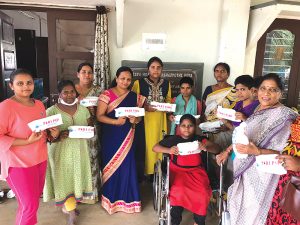Access to feminine care and hygiene may be a given for the average young girl in America, but it is a far cry from the reality young girls in India are facing.
A 2016 study by the National Family Health Survey found that 75 percent of females ages 15 to 24 years old have only everyday cloth to rely on during their periods and 27 percent of girls do not use anything at all. Statistics like this are the very thing that inspired Vennela Vattikuti and Nitya Sripati to found Pari Pads, a nonprofit organization dedicated to providing menstrual pads to girls in third-word countries.
The two young girls met through the Young Entrepreneurs Academy (YEA!), a 33-week program that takes motivated middle and high school students through the process of launching and running their own real businesses with a fun, hands-on, projects-based approach while developing lifelong leadership skills. The program is sponsored by the Frisco Chamber of Commerce in partnership with the Frisco ISD and the Frisco Economic Development Corporation and provides guest speakers and trips to local companies to help kids develop their own businesses. Many YEA! graduates have continued to operate their businesses well after completing the term, something Ms. Vattikuti and Ms. Sripati plan to do, as well. “YEA! was instrumental in helping us set up a business plan and start raising funds, but now that the program is over, we really want to find more efficient ways to raise money and get the word out about our organization,” Ms. Sripati says.
 A lot of people do not realize how big a problem the lack of feminine hygiene products is for girls in India. Ms. Sripati explains, “Because they are not able to afford or even have access to pads, usually the girls just stay home during their periods, so they are missing at least a week of school. That really adds up over the year and, oftentimes, leads to the girls just dropping out all together.”
A lot of people do not realize how big a problem the lack of feminine hygiene products is for girls in India. Ms. Sripati explains, “Because they are not able to afford or even have access to pads, usually the girls just stay home during their periods, so they are missing at least a week of school. That really adds up over the year and, oftentimes, leads to the girls just dropping out all together.”
A majority of the schools in rural India do not even offer facilities where girls could change their sanitary napkins or wash their clothes with soap, giving the girls only the option of facing an infection due to unsanitary conditions or forcing them to not come to school while menstruating. However, without a proper education, poverty-stricken girls in India often end up in arranged marriages to older men or in child labor camps. “We always tell people, for every dollar you donate, you are keeping a girl in school for 10 days because each dollar amounts to two boxes of feminine hygiene pads,” Ms. Sripati says.
Ms. Vattikuti was already involved with the Save the Child Foundation, an organization dedicated to saving special needs children, underprivileged children and orphans. Through Save the Child, they got in touch with Asha-Jyothi, a volunteer-based nonprofit organization dedicated to serving the needs of the underprivileged by providing access to education and healthcare. These two organizations are primarily how Pari Pads have been distributed to girls across India and Nepal.
“We founded Pari Pads about a year ago, and already we have given about 80,000 to 90,000 pads and helped between 16,000 to 20,000 girls,” Ms. Sripati informs. “A woman named Madhavi Mallavalli who works with both Asha-Jyothi and Save the Child helps us distribute the pads on trucks in India called ‘lorrys.’”
Over the summer, both girls had the opportunity to travel overseas to India and Nepal and see firsthand the difference they are making and distributed some of their products themselves. Ms. Sripati spent most of her time in India, while Ms. Vattikuti actually made the strenuous trek to Everest Base Camp in Nepal to promote Pari Pads, a feat she had been training to do for months prior. “We actually got to visit an Asha-Jyothi center and hang out with around 60 special needs children, as well as meet some of the girls who have used our pads,” Ms. Sripati says. “It was a pretty cool experience to have them come up to us and thank us for being the reason they have been able to stay in school.”
 While Ms. Vattikuti was hiking to base camp, Ms. Sripati visited one of Asha-Jyothi’s manufacturing units where the pads are all painstakingly woven by hand. While there, she made some pads herself, but also learned more about some of the obstacles they are facing as they continue growing their organization. “A lot of times, in India, we have these power outages for about two or three hours. Sometimes, it can cause the equipment to break to the point it needs replacement and we just will not be able to keep up the funds for new equipment long-term,” Ms. Sripati explains. “Eventually, we would love to get to a place where we could partner with a large vendor to distribute the pads because it would be much more cost effective.”
While Ms. Vattikuti was hiking to base camp, Ms. Sripati visited one of Asha-Jyothi’s manufacturing units where the pads are all painstakingly woven by hand. While there, she made some pads herself, but also learned more about some of the obstacles they are facing as they continue growing their organization. “A lot of times, in India, we have these power outages for about two or three hours. Sometimes, it can cause the equipment to break to the point it needs replacement and we just will not be able to keep up the funds for new equipment long-term,” Ms. Sripati explains. “Eventually, we would love to get to a place where we could partner with a large vendor to distribute the pads because it would be much more cost effective.”
Ms. Vattikuti will be entering her sophomore year at Liberty High School and Ms. Sripati will be going into her freshman year. They are still working on getting an online donation form up and running, but, for now, you can often find the girls raising money at local malls or setting up booths at Indian festivals around Frisco and the neighboring communities. While monetary donations are always welcome, the girls also say anything from soap to clothes and toothpaste are also helpful to their cause for promoting hygiene.
“Because feminine knowledge and menstrual hygiene are so commonplace here, it is easy to forget how hard it is for girls in other countries who may not even know what a period is before they get it,” Ms. Sripati comments. “If all Pari Pads ever does is stop one girl from dropping out of school, it is worth it.”
To learn more about YEA!, visit www.friscochamber.com. To learn more about Pari Pads or to find out how you can get involved, visit www.paripads.info.







